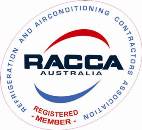RACCA Australia President, Kevin O’Shea gave a presentation at the inaugural ATMOsphere Australia on RACCA’s position on natural refrigerants.
Kevin’s presentation can be found below, along with accompanying slides that were presented at ATMOsphere Australia.
RACCA’s position on natural refrigerants
The Refrigeration and Air Conditioning Contractors Association (RACCA) is an association made up of predominantly contractors in the refrigeration and air conditioning industry, with the majority of our membership comprising of small-to-medium sized companies, as well as technician members in some states.
RACCA holds the belief that all refrigerants have a risk of danger if they are not handled by competent people. As a responsible organisation, we embrace any refrigerant that is better for the environment and can be safely used by the industry.
It is a hard question to ask an employer what is the priority—the safety of your employees or the environment? RACCA believes that you need to achieve both. How do you achieve both you ask? It will only come with the technology of making equipment safe and lifting the competencies of technicians working with these refrigerants. We seem to be at a point where equipment is now designed for the safe use of natural refrigerants.
Ammonia with its small charge and plant room ventilation CO2, now they are commonly used and hydrocarbons started to take off in small charged equipment.
RACCA sees that these refrigerants will grow in the future as end-users require more environmentally friendly footprints for their business. As the technology around these refrigerants has grown, it has made the systems more energy efficient.
RACCA would like to see that any retrofit of a system to a hydrocarbon would have to be approved by an independent and highly competent certifier. I believe that only large systems should be retrofitted to hydrocarbons, as with smaller systems to make them intrinsically safe would be cost prohibitive.
With safety in mind, RACCA worked alongside the industry to develop reference manuals for training. These manuals are:
- Appliances and Heat Pumps Using CO2
- Appliances Using Hydrocarbons
- Commercial and Industrial systems using CO2
These manuals covered, safety awareness and legal requirements for hydrocarbon refrigerant when used in small refrigerated appliances, as well as:
- Service and repair of small refrigerated appliances using hydrocarbon refrigerant,
- Safety awareness in using and working with carbon dioxide refrigeration systems,
- Installation commission service and repair of carbon dioxide subcritical refrigeration systems,
- Safety awareness using carbon dioxide as a refrigerant and
- Service and repair of self-contained carbon dioxide refrigeration and heat pump systems.
RACCA taking natural refrigerants to regional New South Wales project was established under the Council of Australian Governments. The targeting skills needs in regions program was supported by: the Federal Department of Education, Employment and Workplace Relations, the New South Wales Department of Education and Training and the New South Wales Department of Industry and Investment.
RACCA New South Wales worked in partnership with TAFE New South Wales through the project stakeholders committee and the technical reference groups for hydrocarbon and carbon dioxide refrigerants to:
- Develop and deliver accredited training programs for natural refrigerants CO2 and hydrocarbons for upskilling regional refrigeration mechanics.
- Run awareness and information sessions on natural refrigerants for refrigeration technicians across regional New South Wales.
- Obtain equipment operating on natural refrigerants for regional TAFE campuses through industry donations.
- Upskill TAFE New South Wales teachers in regional refrigeration campuses to deliver safety awareness and systems training in natural refrigerants.
What I see as a drawback at the moment for the growth of ammonia CO2 and hydrocarbons, is making sure all technicians are competent in the use of these refrigerants. Talking to TAFE teachers across the country, they tell me that the standard of apprentices is very poor. The industry needs to get together and start to attract the better standard of apprentice, we need to make our industry sexier to the younger age group. If you think about what we expect from our technicians, especially when it comes to diagnostic skills, for them to be very good at their job that person needs to be very smart. Any employer will tell you that highly competent technicians are very rare.
RACCA believes in licensing for all of our industry and would like to see a national occupational licence, not just the current environmental licence under the ARC. If we had an occupational licence, it would mean that all refrigerants would be covered and would require anybody touching a refrigeration or air conditioning system to have a licence.
To conclude, RACCA:
- Embraces any new refrigerant that is better for the environment and can be used safely by competent technicians.
- Would like to see the standard of apprentices raised and for our industry to get the recognition it deserves so it can attract a better standard of participants.
- We would like to see ARC cover occupational as well as environmental licences.
- Independent and highly competent certifiers engaged to approve retrofitting systems to hydrocarbons.
- And last but not least, we would like to see that no system is retrofitted if it increases the risk of danger.
Thank You.
The slides accompanying Kevin’s presentation can be found here: RACCA’s position on natural refrigerants
According to an article published by Hydrocarbons21.com, ATMOsphere Australia was a roaring success with over 200 delgates attending. Along with RACCA, several Australian and New Zealand HVAC&R associations gave presentations focusing on the barriers and opportunities for natural refrigerants. The associations who gave presentations included: ARA, ARMA, CCCA, Refrigerants Australia and AREMA. The common topics present across all the associations’ presentations were the need to raise training standards, national licensing and effectively raising awareness of the safe use of refrigerants.
The article also states that ATMOsphere Australia will be held again next year.
Read Hydrocarbon21.com’s article in full here.



